I knew that what I would write would never be published by the ‘Bar Journal.’ So I happily write it for ‘The Rag Blog.’ Here I stand, though the road was not exactly what I expected.
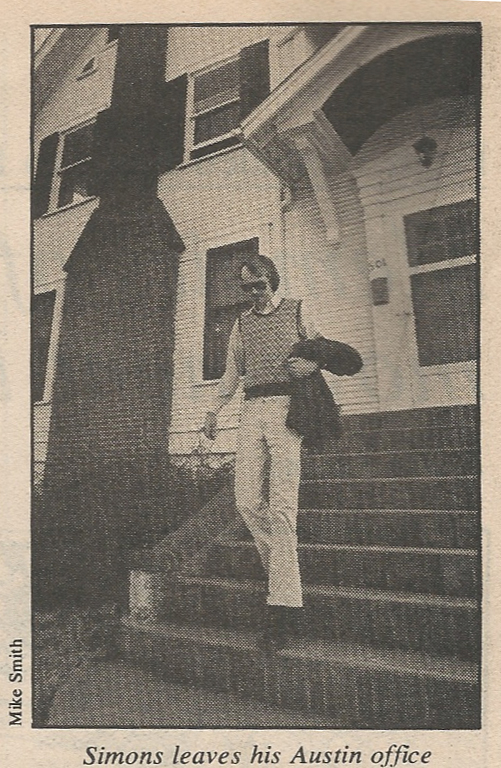
Lawyer Jim Simons at his Austin law office. Image from the Feb. 25, 1977 Texas Observer special issue on Texas lawyers. Jim wrote an article entitled, “Memoirs of a Movement Lawyer.”
AUSTIN — In 1964 I was sworn in to practice law in the old Supreme Court Building just northwest of the Capitol. I had many notions of what I was in for. Some were just the stuff of bad dreams, some absurdly romantic or idealistic.
There was a still small voice that told me I did not want to do this. Lawyers were said to be stuffy and conservative. I knew I was not the latter and hoped I was not the former. I had deep-seated doubts about how I might fit in. I knew I was very much an outsider in law school. I had rebelled against the phony solemnity of the institution.
I wrote a sharply satirical piece for the campus humor magazine that was published after I had escaped the law school (graduated). It was my way of retaliating against the place after my last semester was made a horror show. An assistant dean I lampooned never again spoke to me (but I rarely saw him).
Mostly I just exclaimed “whew!” and left law school behind. But was the State Bar any better? I didn’t know then I would file two federal lawsuits against the State Bar of Texas, winning one of them. I didn’t know who would give me a job or whether I would ever actually practice law. (I did for more than four decades.)
Over the early years I scoffed at the occasional Bar Journal article wherein a lawyer of 50 years would share his/her thoughts looking back over all that time. What could these old duffers teach me or anyone else? In that time so few lived that long or could still write at that stage; one who could was given a page in the Bar Journal to share gems of wisdom.
I did not believe one could engage in law for so many years. I never dreamed I would someday be one of them. This year I reach that milestone and along with about 300 other such survivors I was honored at the State Bar Convention, but alas not offered the page in the Bar Journal — too many of us in this age of living longer.
I knew that what I would write would never be published by the Bar Journal. So I happily write it for The Rag Blog. Here I stand, though the road was not exactly what I expected.
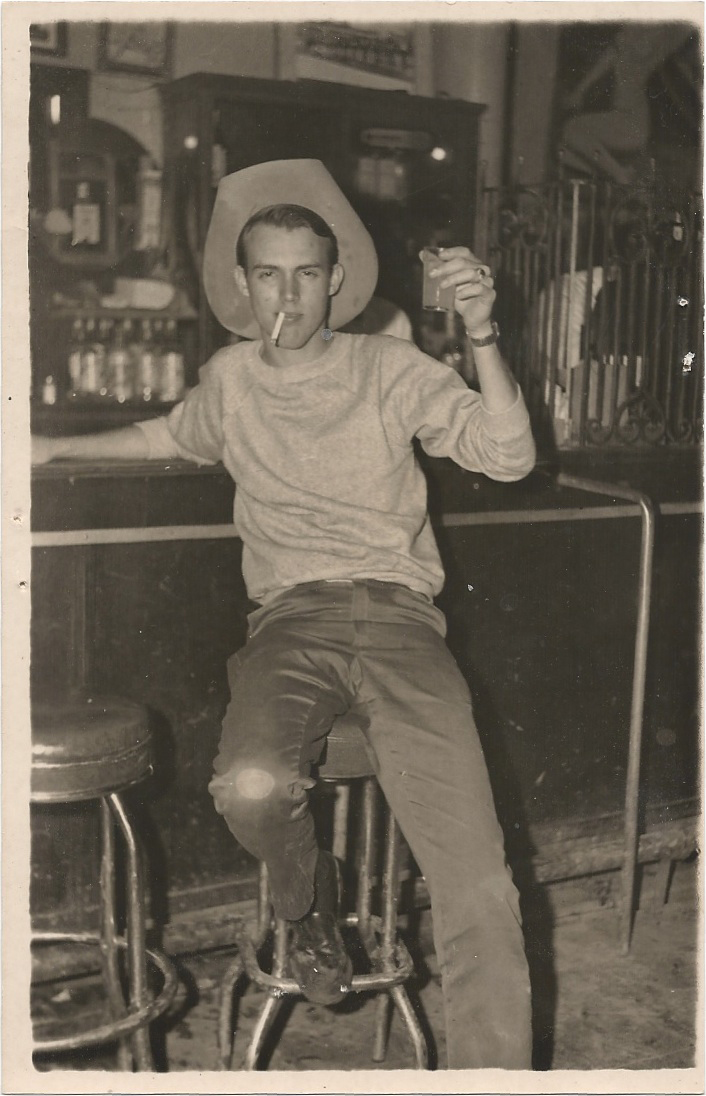
“Jimmy Tequila.” Simons raises one at a local saloon in 1960, the year he entered law school at UT-Austin.
Most law students aim for good grades, law review, and a job with a big firm. These were not among my fondest desires. My grades went from very good in subjects I cared about, e.g. Constitutional law, to very bad in courses I hated, e.g. a course that was then called simply Corporations — a spread of 34 points.
My study habits were not suitable for law school. Most of it was colossally boring, and I found Scholz’ Beer Garden more stimulating. I wasn’t the only law student spending precious study hours under the trees of the beer garden. Some in frequent attendance there did poorly in law school but became judges. One who became a Texas Supreme Court Judge often serenaded the garden from atop a table. The stories are legion. Beer seemed to flow smoother from taps than case law did from tomes of the ages.
But there were the eager beavers who devotedly sacrificed all in pursuit of top grades. Once I came upon a scrawled schedule of one of them in the library. His day started early and went late, all filled with study time for various courses and in a small time slot after dinner the student had penciled in “wife.” She got a whole half hour of his day. No doubt these were the ones who went to those big firms. John Grisham and others have chronicled the life in those firms. Personally none of them were friends of mine, nor did any become friends over my 50 years.
The way law is taught in almost all law schools does not really involve intellectual curiosity or a search for truth.
The way law is taught in almost all law schools does not really involve intellectual curiosity or a search for truth. The cases read each day are supposed to delineate rules of law in a given field such as Torts or Oil and Gas. These are appellate opinions written by judges or their clerks in a style not appealing to most readers. So studying is hopelessly dull. It was such a shock to my system that I left law school after the first semester to take my fourth year in undergraduate.
I had entered on a combined degree program after only three years of arts and sciences. I went back and relished the philosophy and literature courses I had skipped over. But after that year I had to decide what to do. I considered graduate school but it seemed such a long haul. So I went back to law school but at least I knew what to expect. By then I had convinced myself that I did not have to be like most lawyers, I could find a way to use law to serve my convictions and values. It was admittedly a vague plan.
In 1964 the system of justice still clearly was designed to and did serve the interest of the ruling class. But there were stirrings of some practitioners who wanted to use the system to change the lot of the poor, the disenfranchised, and by supporting activists for civil rights and peace. The times they were a-changin’. Civil rights actions had succeeded to a surprising degree. The NAACP lawyers, such as Thurgood Marshall, had shown everybody how litigation can foster significant social change. Left lawyers, largely in New York, had lead the way in defending activists brought up before the infamous House Un-American Activities Committee. The federal government had embarked on a War on Poverty and a network of legal services programs were funded.
An arid legal landscape was changing. I silently thanked my parents for bringing me into the world at a time that caused me to graduate law school in the mid-60s into what became the most exciting time to practice law in the 20th century, perhaps in the history of the USA. The Warren Supreme Court and a very liberal Fifth Circuit federal appeals court inspired hope and action in many progressive hearts.
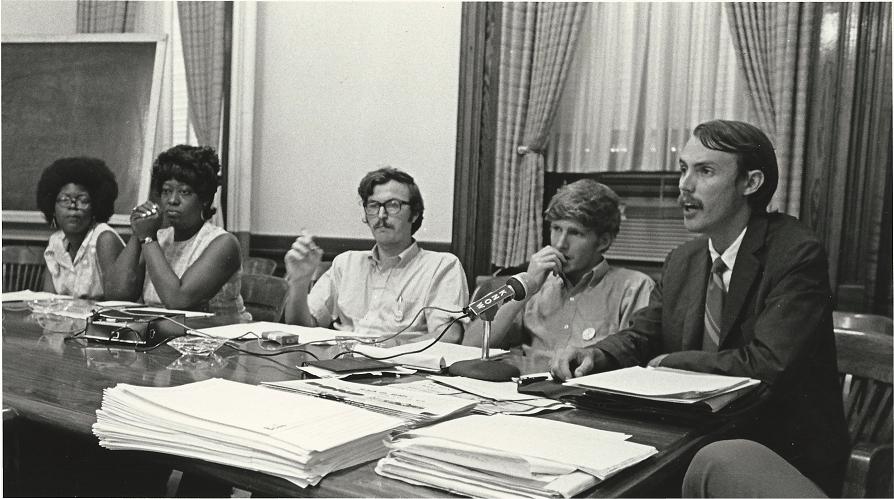
Jim Simons, right, at a 1971 press conference at the Texas State Capitol, circa 1971, concerning a political court martial at Fort Hood. Next to Jim is Dave Zeiger who would produce and direct the award-winning film about the GI anti-war movement, Sir! No Sir! Photo by Alan Pogue.
At graduation I learned of a new program for sending legal interns into the South to work for and support the continuing drive for basic civil rights. The National Lawyers Guild was funding it. I applied and was sent to Atlanta to work in the office of the ACLU headed by noted renegade Alabama lawyer Chuck Morgan. The grant was for only $50 a month and I lived with a Mennonite collective. Even with free rent I got a sharp lesson about the real world. It proved impossible to live on the money I received from the NLG. But before I left I got the incredible opportunity to work (in a small way) on landmark cases for voting rights in the Southern states.
In the real world back in Texas I needed a job.
In the real world back in Texas I needed a job. My education debts were coming due; I had a baby daughter. In 1965 Austin was about the hardest place in Texas to get a job. I went to Houston to find employment with a solo practitioner in suburban Pasadena. There was such a thing as a general practice then. So I got a good taste of many kinds of law– criminal defense, wills and estates, that old standby, divorce, even a guardianship.
I thought my boss who was 15 years my senior was an uptight typical lawyer, white, middle class and conservative. Now I know I was wrong. He was only typical of solo and small firm lawyers laboring away to stay alive. Years later I learned he was not conservative politically, as I had only imagined. In retrospect I have much respect for my first boss who, unbelievably, is still practicing law at about 90.
I was appointed Assistant City Attorney of Pasadena at a higher salary. There was the City Attorney and I, the only assistant: a two-man Law Department. The less said the better. I got to try a couple cases in the night court (Municipal), the lowest level misdemeanors; but one was a jury trial against up-and-coming star Racehorse Haynes. Mostly I languished in civil matters only a bureaucrat could love.
My jobs as an intern in the South, in private practice, and as a public lawyer had taught me much. But it was time to move on. Timing is everything; chance is the great manipulator. I just quit the Pasadena Law Department one day and the next I up and drove to Austin. Why? I honestly don’t know. I had no plan.
When I got there I phoned a friend to say hello. It was Ronnie Dugger, editor of the liberal Texas Observer. He said he had just been contacted by a representative of the federal war on poverty program, the Office of Economic Opportunity (OEO). He was looking for a lawyer or journalist to be part of the Office of Inspection out of Washington D.C. But the hire would be part of the OEO Southwest Regional Office in Austin. I called the OEO guy right then and we made an appointment. I was hired that day.
Everything about this job was to my liking. I had to travel the five states of the region and write reports on what I found in the gamut of component programs, the reports going to the Washington OEO and to Director Sargent Shriver himself up where the buck stopped in the agency. The pay was double what I made in Pasadena. I could move back to Austin, as I had ached to do.
I had an office in the Southwest Regional Office but my nearest boss/supervisor was in Washington. I had autonomy and authority. Most of all, I was part of the War on Poverty. In 1966 this was an exciting and promising governmental initiative. I believed in it strongly. Viet Nam was an important daily news story but its brutality and ugliness were only rumors. It’s true JFK had been assassinated and dark undertones were rippling through the country. These events would come to have monumental significance but they were murky at the time. Personally I was still basically a liberal. That was to change the next year.
The theory behind Community Action Programs was that the poor themselves would become organized and make basic reforms to bring them out of poverty.
The theory behind Community Action Programs (CAP) was that the poor themselves would become organized and make basic reforms to bring them out of poverty. And it worked too well. In many communities across the country these CAPs did just that only to be confronted and blocked by the establishment of powerful politicians, wealthy citizens — what in his book C. Wright Mills called the power elite. When these confrontations occurred, guess who prevailed. That was the essential flaw in the concept. Conservative Congress members held hearings to belittle, discredit, and stir up fear of CAP.
Being part of the organizing and galvanizing of the folk in many communities was incredibly inspiring. Seeing them betrayed by liberals in Congress, the White House and even in the hierarchy of the agency itself was incredibly deflating. It happened a few times too many for me. At the same time, the escalating war in Viet Nam was being revealed for the savage, unwinnable quagmire it was. U.S. imperialism had made its face manifest and in the process it was murdering literally millions of civilians.
As we began to see this, something like horror was dawning on many in this country, me among them. I was coming to see the federal government as the enemy. And I myself worked for that selfsame government. It was a crisis in conscience from which my political radicalism emerged. I would never again see my work or even life itself in the same hopeful glow of liberal complacency. By the end of 1967, I knew I had to act. But how, and do what?
It was the pivotal time in my years as a lawyer, arguably as a human being.
It was the pivotal time in my years as a lawyer, arguably as a human being. I was in Austin so I could see the Movement happening, just beginning to be visible. I met some people — I remember Mariann Vizard [now Mariann Wizard], John Muir, Chet Briggs — to name a few. Martin Wigginton was a friend from liberal politics who was having the same political identity crisis. We went to a last liberal Democrat conclave in Fort Worth where we fought to get a resolution passed condemning the war in Viet Nam. When we failed we were two newly minted Texas radicals. Our lives were never again the same.
In September 1967 there was a radical gathering in Chicago called the National Conference for New Politics. Chet Briggs was an organizer. There were a dozen or more Texas people who accompanied Martin and me to the conference.
By December I phoned in my resignation to OEO from New Orleans where I was on assignment. I had been forbidden to make any contact with militant groups, as I usually would have done. An “ex-FBI” agent was suddenly with the group that went to New Orleans and he seemed to be shadowing me. I was not paranoid; this fellow turned up almost everywhere I went. Was he really ex-FBI, or still an agent? I will never know. It didn’t matter; I was done.
I had indeed become disillusioned with the War on Poverty but the real catalyst was the war in Viet Nam. Looking back over all the years, it was the watershed-defining event of my time and I believe for others. We saw the war as a crime against humanity. That picture of the little girl running naked from her village to avoid more U.S napalm was one I could not get out of my mind. Reports of bombings that killed many in the countryside, mostly civilians, were morally repugnant.
The anti-war struggle had become a moral, not a political, issue. We felt an imperative as human beings to stop the savagery being perpetrated in our name. The war was all wrong. The country had gone off its tracks and become the bully killer of the world. We knew enough to reach this conclusion then but had we known exactly what was happening we might have become Weathermen.
Now we do know exactly how monstrous it was, thanks to a thoroughly investigated and documented book — Kill Anything That Moves by Nick Turse — revealing that around 7 million Viet Namese were killed by our country based on the ridiculous “Domino Theory” of the red menace. Moreover, there were many instances of deliberate brutality and massacres of non-combatants including many women and children. Nothing like this had happened before. Sorry to say the government has continued to invade other countries and kill at will. Hell, now we can even do it with drones! I felt then there was no choice but to be a radical and that has not changed with the years. We simply do not live in a country where liberalism is enough.
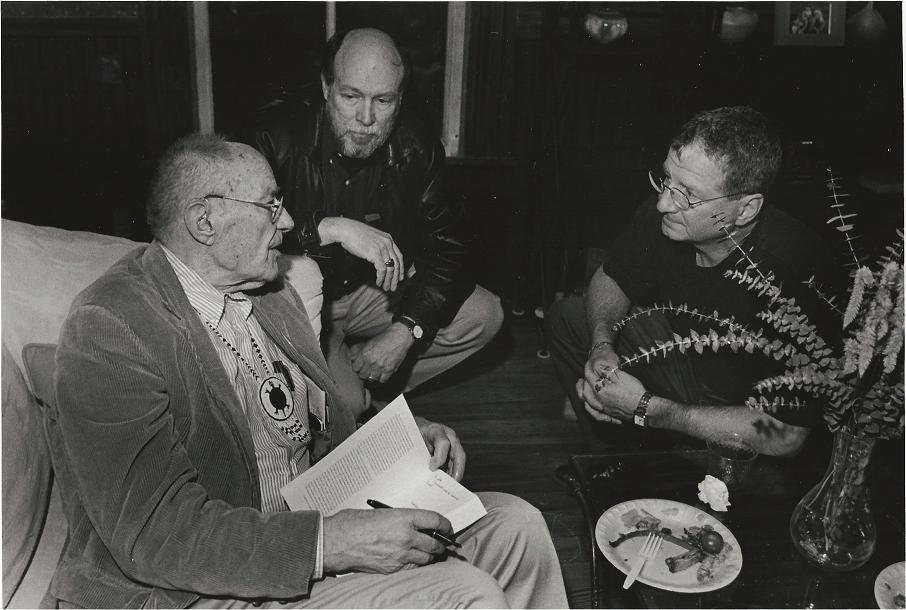
Jim Simons, center, at reception with peace activist Dave Dellinger (left) and Houston attorney Greg Gladden. Photo by Alan Pogue, circa 2002.
Movement groups around the country were taking action, which meant people were getting arrested. Young men were getting drafted to be sent to Viet Nam but many resisted. Soldiers already in the military were becoming conscientious objectors. Affirmative suits against the state or nation were being won in the Warren Court and in some circuit appeals courts boldly applying constitutional principles.
Why should I not put my law license to a worthwhile use? The idea of hanging the proverbial shingle was impractical and unwise as most lawyers told me. But I was not deciding on a bottom line basis. I just wanted to do work I truly believed in and I wanted to be a part of the Movement and the New Left. And so on January 1, 1968, I launched a solo private practice intending to represent activists, revolutionaries, renegades, GIs ready to take a stand, civil rights groups and individuals, whatever case I considered worth fighting. Already a radical, I became a radical lawyer. I was not alone as I soon discovered.
I know that the State Bar of Texas does not approve of radical lawyers.
I know that the State Bar of Texas does not approve of radical lawyers because in 1970 we formed a Radical Lawyers Caucus seeking to get inside the state convention of that year. Our notice of being at the convention to speak to and proselytize the Texas lawyers was rejected for publication in the Bar Journal. We sued the bastards and won. Two years later a liberal-leaning State Bar president named me to be on the committee to encourage and develop minority participation in the bar. But my name disappeared before I could serve. I don’t honestly know how it happened.
The same lawyer who put my name up later invited me to speak to a local multi-county bar meeting in a small town on the topic “What is a Radical Lawyer?” I had the time of my life doing that and found some favorable reception in rural Texas. Although many complained unbelievably that I used too many big words. I’m not kidding and I don’t think they were.
The surprise is that I did practice law in that mode for over 40 years in Austin. It did not make me rich and it was not always easy but I never had a grievance filed by an unhappy client or a malpractice case. I doubt every client was happy and God knows I was not happy with every client. But on the whole I got to be the lawyer I wanted to be, to do the kind of law I wanted to do. I hope and believe I was able to make a contribution to the Movement for meaningful change.
I have not tried to delineate specifically my beliefs. That is another article. A very cogent statement of where we are today and what is wrong with it is set forth in Chris Hedges’ book, Days of Destruction Days of Revolt, especially the summation in the last Chapter 5. Here is a quote I like:
A society is in serious trouble when its political pariahs have at the core of their demands a return to the rule of law. This inversion, with our political and cultural outcasts demanding respect for law, highlights the awful fact that the most radical and retrograde forces within the body politic have seized control.
…We cannot rely on the institutions that once made piecemeal and incremental reform possible… The more we sever ourselves from the addictions of fossil fuel and the consumer society, the more we begin to create a new paradigm for community. The more we engage in physical acts of defiance…the more we can keep alive a new, better way of relating to one another and the ecosystem.
We must stop being afraid. We have to turn our backs for good on the Democrats, no matter what ghoulish candidate the Republicans offer up for president. All the public disputes between candidates in the election cycle are a carnival act. On the issues that matter, there is no disagreement among the Republicans and Democrats. We have to defy all systems of power.
[Jim Simons practiced law in Austin for 40 years, representing many movement activists, including anti-war GIs. Jim served as a counsel for members of the American Indian Movement who were arrested at Wounded Knee in 1974. After he retired he published his memoir, Molly Chronicles, in 2007. Read more articles by Jim Simons on The Rag Blog.]

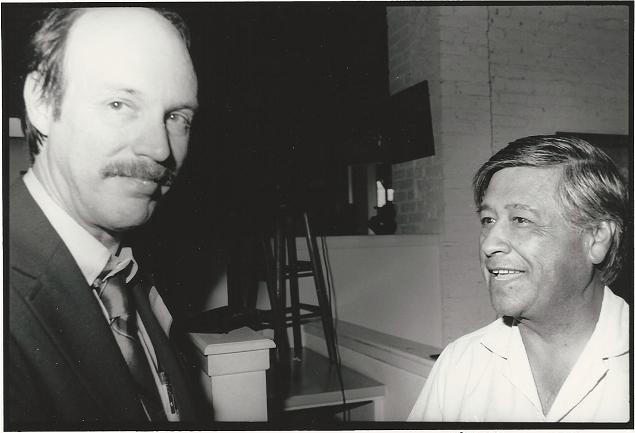

















Jim, if I have not thanked you before, I hope I did, let me do so now. You stood with the VVAW Texas 3, for John and Bill let me thank you also. I’m still alive. You stood with my brothers and sisters at The Knee, if they can’t thank you, I do, I’m still alive. Jail in Florida wasn’t any fun, but the jury couldn’t convict and indeed some were at our reunion. No, I didn’t make the last, I won’t come back to the Corporate Police State of Amerika. I have come to hate this phrase, but thank you for your service. Mi casa es su casa if you ever get to Thailand. My you live as long as you wish.
I liked and appreciated your comment and it made me recall the departed John Kniffin and Bill Patterson with whom I spent much time back then. Glad you are still around though sometimes we old warriors are not readily understood. I’ll see you if I get to Thailand.
Jim was one of those NLG and ACLU attorneys who was an inspiration for me to make a difference with my law license. Perhaps inspiring others while doing good is a by-product of a well-lived life that is too little recognized.
Too bad that the mistaken belief that “too many of us are living longer” managed to find a place in this otherwise thoughtful article. A review of the ages of former Presidents of the United States, or a walk through the veterans of the Civil War cemetery in Austin will reveal that the human life span has not changed from the normal age of 80’s, 90’s, and 100’s. The reason more of us are living longer is because of the baby boom. The life span of Americans is in fact being reduced, as our falling place in health among the nations of the world reveals. We were 37th according to the United Nations just a few years ago. The third cause of death is going to the hospital, as Bernie Sanders has made a point of discussing, and was revealed in the Rag Blog itself.
Thanks, Jim. Always admired you and your work. Just now finding out we were getting radicalized by our OEO experiences at about the same time. My own little victory came when Nixon tried to erase my “doctors on retainer” program in rural Arkansas. The local citizens overruled….we set it up to run on a barter system and the local doctors there, not impressed by a federal directive, refused to stop helping the poorer families in their community. A drop of good in an ocean of bad.
It might be added that Jim, Brady and Cam et. al., were models and mentors for us only slightly younger lawyers in Houston in the early 70s and more than once came over to rescue us (legally as well as spiritually), or at least me anyway.
Nice follow-up to the Molly Chronicles Jim; keep writing!
Jim, I’ve often thought back to the conversations you, Martin, Sue Jan and I had in the house on Red River the summer you turned rad — the Movement needed you both pretty bad!
Here’s something funny I bet you don’t know: visiting you one evening in the company of Larry J., when you lived on E. 38 1/2 St., was one of the first times I’d visited anyone who lived in “East Austin”! Is that a hoot or what?? Later I lived for many years in Delwood; what a great community.
Lots of great memories. I got to drive Wm. Kunstler to the old airport from some NLG conference y’all had out in the boonies; I had a car and volunteered to drive if needed and got him by luck of the draw I guess; only time I ever met the man. No recollection of what he talked about (I drove!) but it was a gas at the time!
And hey, don’t forget to let people know about the memoir you wrote for “No Apologies”; that book grows more precious to me with each passing year; just a couple of weeks ago I referred someone to your section, where you wrote about the Don Weedon incident, since shrouded in legend and b.s.
Thanks, Counselor — but we don’t believe in retirement around the Rag Blog!
I won’t ever retire from fighting for change– peace and justice. From law, that’s different. There comes a time when it is not really fair to clients and it is an ethical imperative to put down spear and cudgel and let a younger, more capable advocate take the case. This is especially true of trial work which is what I did. Thanks for your nice thoughts and memories.
Since I’ve been a neighbor now for what, twelve or thirteen years?, I now appreciate more thoroughly the level of humanity and tolerance you and Nancy have always displayed to our shenanigans.
I didn’t have a real clue about what I was doing when I enlisted but Vietnam turned out to be a lot different than even I expected.
Jim,
I enjoyed your Memoir(s).
I wonder if you ever crossed paths with Emerson Stone, attorney, who was the statewide campaign manager for Ralph Yarborough in 1964 and 1970, when he lost the primary to Lloyd Bentsen.
Let me know if so and best wishes.
Bill Stone
Attorney, Bellaire, Texas
I happen to be Martin’s grandson, do you happen to have more information about him?
Alex, can you give your contact info to editor@theragblog.com?
There’s two Texas Observer articles. One by Dave Richards: https://www.texasobserver.org/18-on-the-left-a-gathering-of-legals/
And another by Jim Simons: “Sacred Buffalo of the May Day Tribe” Texas Observer, July 16, 1993
Hi Jim: My name is Eloy Padilla and a veteran of the Weedon “case”! If you were one the lawyers that helped us at that time, I thank you from the bottom of my heart. A moment during the picketing at the gas station is when we decided to sit down in front of the cars and I had to jump quickly from getting hit by a big Lincoln Continental and I noticed that the side window had a sticker that stated “Member of B’nai Brith (sp); and the license plates said F Erwin! What a hypocrite!!
The arrest record was supposed to be deleted but it appeared on my FBI record when I applied to Thurgood Marshall School of Law in 1987. Meeting with the Dean and explaining the incident didn’t hurt my application. Still fighting the good fight in my home town of Del Rio, working for Legal Aid and private practice!! Thanks again, Jim